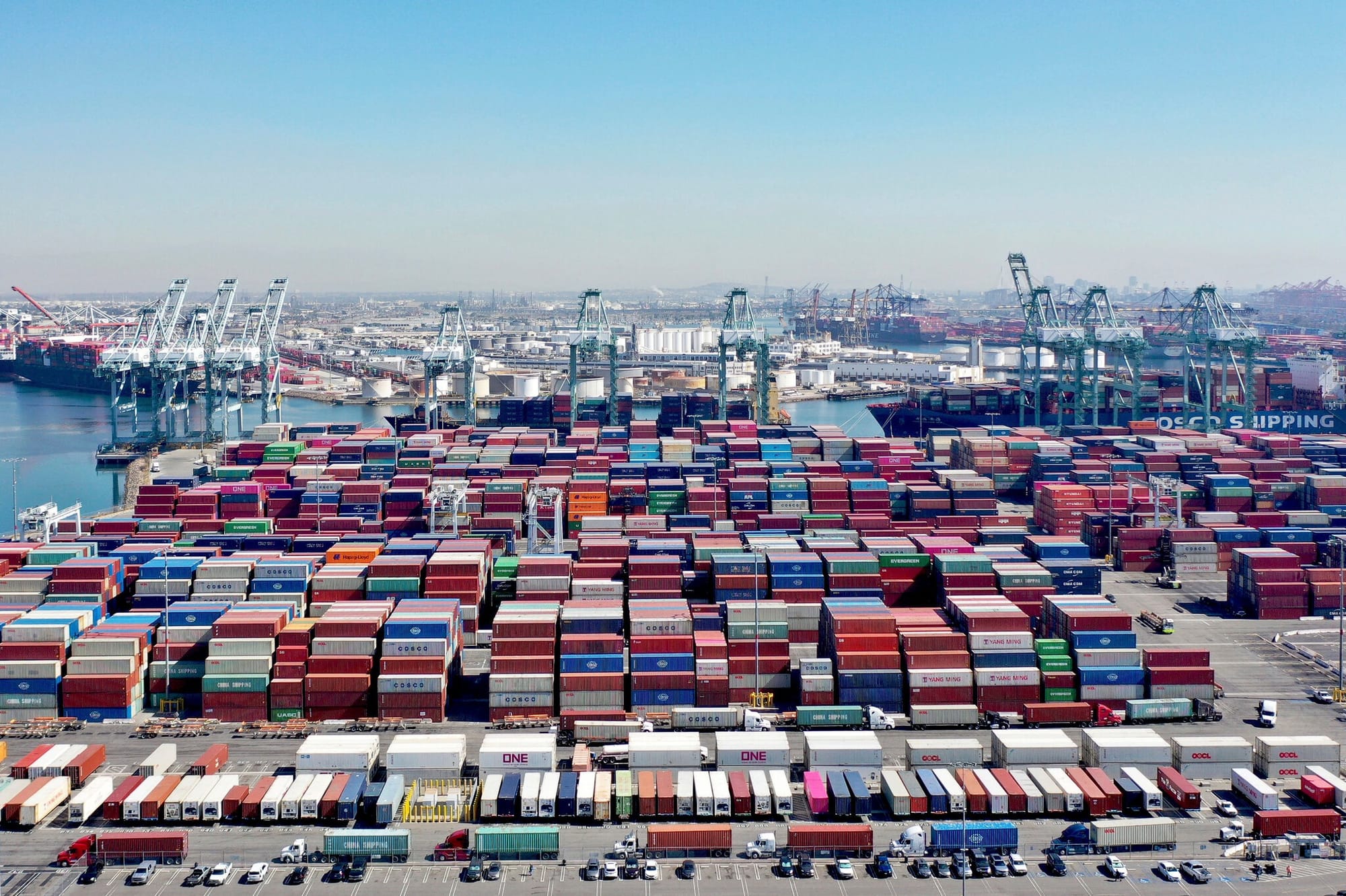May 1 2025
1Q GDP falls; Strong tech earnings; Trump orders fast interim Air Force One; US pivots to universal vaccines; US gets Ukraine mineral access

Import Surge Skews Q1 GDP; Consumer Strength Faces Looming Tariff Test As Senate Rejects Bid to Undo Trump Tariffs
Tech Resilience? Strong Reports From Meta, Microsoft, Google Parent Alphabet Reassure Investors Amid Trade Uncertainty
Frustrated Trump Orders Fast-Tracked Presidential Jet From L3Harris as Boeing Lags
‘Generation Gold Standard’: US Bets $500 Million on Universal Vaccines, Pivoting From Covid Focus
US, Ukraine Ink Economic Partnership: Reconstruction Fund Established, Mineral Access Granted
GET THE CITIZEN JOURNAL APP - FREE!
1. Import Surge Skews Q1 GDP; Consumer Strength Faces Looming Tariff Test As Senate Rejects Bid to Undo Trump Tariffs
Donald Trump’s ultra-high tariff regime, which was rolled out on April 2, right at the start of the second quarter. So that day casts a shadow over the first quarter advance GDP report, which landed yesterday. But the report was a pleasant surprise. The “before” picture looks pretty good. Yes, headline growth was negative 0.3 per cent — but that number is an artefact of a massive surge in imports, which dragged down the headline growth number by up to 4.8 per cent. Imports are subtracted from GDP because they are not produced in the country (not “domestic product”) and to avoid double counting them in consumption and investment. If the Q1 surge in imports was truly demand pulled ahead, this should be a distortion that will wash out over time. Private investment grew at a stonking 22 per cent [ed note-used to emphasize something remarkable, exciting, or very large] annualised rate from the previous quarter. Almost all of that was down to a huge jump in purchases of computer equipment which by themselves contributed almost a full percentage point to GDP. It seems very likely that a good deal of this was due to companies rushing to fill long-term needs from global suppliers ahead of tariffs. But how much? And how much is continued strong demand from the AI economy? We don’t know, and the answer makes a big difference to our reading of how strong the economy really is. We have good reason to think that the consumer has continued to chug along nicely since April 2. On Tuesday, Visa reported that payment volumes across its US network grew 6 per cent in the first quarter, in line with the results of recent quarters, and volumes actually picked up a bit in the first three weeks of April. Here is the CEO: We have not seen any signs of overall consumer spending weakening. While spending growth differs among consumer spend bands, with the most affluent growing the fastest, all spend bands remain resilient and consistent with past quarters. But consumers have not felt the effect of tariffs yet, either in higher prices or in unavailable products. And few businesses have yet had to make hard choices about whether to absorb tariff costs, pass them on to customers, or simply cease importing certain products. Most will still have pre-tariff inventory to burn through while they pray for a policy change. Bookings for standard 20-foot shipping containers from China to the US were 45 per cent lower than a year earlier by mid-April, according to the latest available data from container tracking service Vizion. Barring a prompt and meaningful tariff climbdown, the “after” picture [of tariffs] will be fully developed by sometime this summer.
The Senate on Wednesday rejected an effort to undo President Trump’s sweeping tariffs on most U.S. trading partners, even as a small group of Republicans joined Democrats in delivering a rebuke to a trade policy that many lawmakers fear is causing economic harm. The vote deadlocked at 49 to 49, meaning it failed despite three Republicans joining Democrats in favor of a measure that sought to terminate the national emergency declaration Mr. Trump used this month to impose 10 percent reciprocal tariffs.
Source: Unhedged Newsletter / NYT
2. Tech Resilience? Strong Reports From Meta, Microsoft, Google Parent Alphabet Reassure Investors Amid Trade Uncertainty
Better-than-expected earnings from both Microsoft and Meta Platforms boosted markets Thursday, reassuring investors of the relative resilience of the "Magnificent Seven" tech giants amid tariff uncertainty. Facebook parent Meta reported strong sales and said growth would remain steady, assuaging concerns tariffs would harm its digital-ads business—a chunk of which comes from Chinese companies like Temu and Shein. Microsoft, meanwhile, indicated that the major corporations that drive the bulk of its revenue aren’t slashing their technology budgets just yet.
Alphabet [Google] shares rose after it reported double-digit increases in first-quarter revenue and profit, driven by another good performance in its search business and the boom in artificial intelligence-related demand for cloud computing.
Source: WSJ / FT
3. Frustrated Trump Orders Fast-Tracked Presidential Jet From L3Harris as Boeing Lags
President Trump is done waiting for Boeing. Frustrated by delays on Boeing’s work to deliver a new Air Force One, Trump has commissioned a smaller defense contractor to ready an interim presidential plane by year’s end. Boeing will continue plugging away on a pair of Air Force One replacement jets, which have fallen so far behind that Trump might not get to fly on them while in office. The U.S. government has commissioned L3Harris to overhaul a Boeing 747 formerly used by the Qatari government. The Melbourne, Fla.-based company is tasked with retrofitting the plane with certain specialized systems to transform the luxury aircraft into a presidential jet, some of the people said. Trump wants to have the plane available for use as early as the fall, some of the people said. He has regularly asked for updates. On April 18, the CEO of Boeing came to the Oval Office to meet with Trump, people familiar with the meeting said.
Source: WSJ
4. ‘Generation Gold Standard’: US Bets $500 Million on Universal Vaccines, Pivoting From Covid Focus
In a shift away from next-generation Covid-19 vaccines, the Trump administration is investing $500 million in a vaccine project championed by two scientists who were recently tapped to serve in senior roles within the National Institutes of Health, according to emails reviewed by The Wall Street Journal. The unusually large sum comes as the nation’s health agencies are cutting budgets, shrinking staff and terminating hundreds of active research grants. The project involves producing vaccines from chemically inactivated whole viruses, a throwback to how flu vaccines were made decades ago. The goal, one that scientists have chased unsuccessfully for decades, is to make “universal” vaccines that protect against multiple strains of a virus at once. The move is part of what the Department of Health and Human Services is calling Generation Gold Standard, a universal-vaccine technology that officials said represents a shift in funding from Covid-19 projects to studies of more viruses. The Generation Gold Standard project includes research on a “universal” flu vaccine co-developed by Dr. Matthew Memoli, who was handpicked by the Trump administration this year as acting director of NIH and now serves as its principal deputy director In 2021, Memoli opposed mandatory Covid-19 vaccination with shots available at the time and declined to be vaccinated. The project also includes research on a second universal flu vaccine and universal coronavirus vaccines, according to the HHS statement. HHS aims to begin trials of universal coronavirus vaccines by 2026, “with FDA approval targeted for 2029,” HHS officials said in the statement.
Source: WSJ
5. US, Ukraine Ink Economic Partnership: Reconstruction Fund Established, Mineral Access Granted
The US and Ukraine signed an “economic partnership” deal on Wednesday that will give Washington access to the country’s critical minerals and natural resources, ending weeks of fraught negotiations. The agreement signed at the US Treasury department will establish a “reconstruction investment fund” for Ukraine that President Donald Trump had insisted on as a way to repay America for aid to Kyiv. The new deal does not include a previous US demand for retroactive compensation for more than $100bn in military support for Ukraine, terms that President Volodymyr Zelenskyy had consistently refused to accept. The Ukrainians also succeeded in removing language from the deal that would have complicated negotiations with the EU. However, they conceded to Washington’s demand that they sign up to more detailed commitments Kyiv had initially insisted were impossible to agree to simultaneously. While Washington has argued that the deal is necessary for any continued US support, it does not include explicit security guarantees, and Ukraine will be beholden to it regardless of whether a peace deal is secured with Russia.
Source: FT
May 1: A lot happened on the May 1’s of yesteryear, and I couldn’t narrow it down. Also, I forgot this day in history earlier this week (as readers reminded me), so here are 3
1851: The Great Exhibition launches in London, drawing 6 million visitors to marvel at global art and innovations. The Victorian spectacle parades steam engines, the world's largest diamond—and the debut of public toilets.
1923: Ford factory workers get one of first 40-hour weeks
1941: “Citizen Kane” released by Orson Welles
Having signed a lucrative contract with RKO studios, Welles was struggling to find a subject for his first feature film when his friend, the writer Herman Mankiewicz, suggested that he base it on the life of the publishing baron William Randolph Hearst. Hearst presided over the country’s leading newspaper empire, ruling it from San Simeon, a sprawling estate perched atop a hill along California’s central coastline. When Citizen Kane finally opened in May 1941, it was a failure at the box office. Although reviews were favorable, and it was nominated for nine Academy Awards, Welles was booed at that year’s Oscar ceremony, and RKO quietly archived the film. It was only years later, when it was re-released, that Citizen Kane began to garner well-deserved accolades for its pioneering camera and sound work, as well as its complex blend of drama, black comedy, history, biography and even fake-newsreel or “mockumentary” footage that has informed hundreds of films produced since then. It consistently ranks at the top of film critics’ lists, most notably grabbing the No. 1 spot on the American Film Institute’s poll of America’s 100 Greatest Films.
SUBSCRIBE ONLINE TO GET THE US CITIZEN JOURNAL IN YOUR INBOX - FREE!

See the Ad Astra Podcast! Released on Apple and Spotify around 10a CST.
Sponsors (click me!)





Sources
- Robert Armstrong, Unhedged Newsletter; https://www.nytimes.com/2025/04/30/us/politics/senate-trump-tariffs.html
- https://www.wsj.com/livecoverage/stock-market-today-tariffs-trade-war-05-01-2025?mod=hp_lead_pos3; https://www.ft.com/content/168e9ba3-e2ff-4c63-97a3-8d7c78802d40
- https://www.wsj.com/business/airlines/air-force-one-trump-qatari-jet-l3harris-fc903838?mod=hp_lead_pos5
- https://www.wsj.com/health/healthcare/rfk-jr-bets-500-million-on-universal-vaccines-in-shift-from-covid-19-funding-0299d927?mod=hp_lead_pos6
- https://www.ft.com/content/1ae70f6c-6651-46e4-bc14-cfd6befc1474

